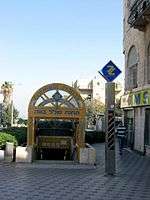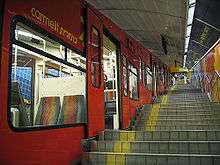Carmelit
| Carmelit כרמלית | |
|---|---|
 | |
 A Carmelit train at Kikar Pariz Station | |
| Overview | |
| Type | Funicular Subway |
| Status | In service |
| Locale | Haifa |
| Termini |
Gan HaEm Paris Square |
| Stations | 6 |
| Services | 1 |
| Ridership | 732,664 (2012)[1] |
| Website | www.carmelithaifa.co.il |
| Operation | |
| Opened | 1959 |
| Owner | Haifa Municipality |
| Operator(s) | The Carmelit Haifa Company Ltd. |
| Character | 1 |
| Rolling stock |
4 Von Roll (now Doppelmayr) funicular cars 2 per train |
| Technical | |
| Line length | 1.8 km (1.1 mi) |
| Number of tracks | 1 |
| Track gauge | 1,980 mm (6 ft 6 in)[2] |
| Operating speed | 28 km/h (17 mph) |
| Highest elevation | 268 m (879 ft) above sea level |
The Carmelit (Hebrew: כַּרְמְלִית, Arabic: كرمليت) is an underground funicular railway in Haifa, Israel. Construction started in 1956 and ended in 1959. It is currently the only underground transit system in Israel, until the expected completion of the Tel Aviv Light Rail, planned for 2021.
The Carmelit was closed in 1986 after showing signs of aging and reopened in September 1992 after extensive renovations. It was closed from March to July 2015 due to a fault in the cable. It closed yet again in February 2017 for renovations following a fire, and reopened in October 2018.
System
The Carmelit, named after the mountain through which it runs, Mount Carmel, is an underground funicular railway that runs up and down parts of Mount Carmel within Haifa. The altitude difference between the first and last stations is 274 meters (899 feet). Carmelit cars have a slanted design, with steps within each car and on the station platform. Since the gradient varies along the route, the floor of each car is never quite level, and slopes slightly "uphill" or "downhill" depending on the location.
The Carmelit is one of the smallest subway systems in the world, having only four cars, six stations and a single tunnel 1.8 km (1.1 mi) long. The four cars operate as two two-car trains, which run on single-track with a short double-track section to allow the trains to cross.
The technology used in the system forces it to have an even number of stations at about equal distances. This means that some stations are not located close to major centers, but were placed there for technical reasons.[3]
History
A rail-based solution to connect Mount Carmel with downtown Haifa was envisioned by the British mandatory authorities. However, only in 1955, under the auspices of then-mayor Abba Hushi, did practical talks begin. The French company Compagnie Dunkerquoise d'Entreprises created a detailed plan and proposed to a generous loan for a large part of the project, and a deal was signed in 1956. The plan was for a funicular system, and the inauguration took place in 1959, attended among others by the French transport minister Robert Buron and Israeli prime minister David Ben Gurion.[3]
Solel Boneh was the Israeli company carrying out the works, which continued at a pace of 3 meters a day, other than a geologically difficult section where a speed of 1.5 meters a day was achieved.[3]
Shutdowns
The Carmelit was shut down for intensive renovation on December 19, 1986, after 27 consecutive years. The old rolling stock was brought to a scrapyard near Kfar Masaryk in 1991, after being offered to the Israel Railway Museum. There, it was refused due to high transport costs.[4] After several delays and failed attempts, renovation work started on October 29, 1990. The Carmelit finally reopened to the public in early September 1992.
In March 2015, the Carmelit was closed again due to a faulty cable, and subsequently reopened in July 2015. At this point, new ticket machines were installed to accommodate the Rav-Kav ticketing system.
On Saturday, February 4, 2017, a fire erupted in the Carmelit's Paris Square station after working hours. One of the two trainsets was heavily damaged, as well as parts of the tunnel. As a result, the Carmelit was shut down and underwent an upgrade that included replacing both trainsets with new ones supplied by Doppelmayr's Swiss subsidiary which built the Carmelit's original trainsets, a new control center, and a major refurbishment of the Carmelit's systems and infrastructure. It reopened in October 2018.[5]
The Carmelit today
The small number of stations means that the Carmelit serves only a small part of Haifa – which was the important population and business center at the time it was designed. Nowadays, the vast majority of Haifa's population does not live close to any of the stations, making it very lightly used. There have been talks of extending its tunnels to reach more population centers, but such an extension has not been done, primarily for fiscal reasons. The most widely used public transportation system in Haifa is Egged buses, which cover most of the city.
Haifa's comptroller wrote in his 2004 report (published in 2005) about the declining use of the Carmelit. According to the report, the Carmelit is used by only 2,000 passengers each day, and has been losing money ever since being reopened in 1992. The accrued losses between 1992 and 2003 are over ₪191 million.
The Carmelit is the only subway in Israel. The Jerusalem Light Rail began operation in 2011, while major construction on Tel Aviv's light rail, much of which will be underground, commenced in 2011. In Haifa, an extensive BRT system called the Metronit was built, which has stops at a few Carmelit stations. It was hoped that this will increase ridership on the Carmelit after the Metronit system began operating in late 2013.
Since October 31, 2010, it is possible to take a bicycle on the Carmelit at no additional cost.
Stations
Properties
The Carmelit stations are small; entrance halls were installed in only the two end stations (Gan HaEm and Paris Square).
Stations in descending order

| Station | Hebrew name | Location | Height above sea level | Picture |
|---|---|---|---|---|
| Gan HaEm | גן האם | Located in the Carmel Center neighborhood, adjacent to the Haifa zoo, a panoramic promenade, the Haifa Auditorium, and many shops and hotels. | 287 |  |
| Bnei Zion | בני ציון | The station was previously named Golomb. Located on Golomb street, near the Bnei Zion (Rothschild) hospital and the Bahá'í World Centre. | 194 |  |
| Massada | מצדה | upper Hadar HaCarmel: near Massada and Nordau streets, with their galleries, antique shops, cafés and restaurants. Close to the science museum. | 118 |  |
| HaNevi'im | הנביאים | Hadar HaCarmel: Near HaNevi'im, Herzl and HeHalutz streets, and their shops and offices. Close to the Haifa museum. Link to: Line 3 of the Metronit | 70 |  |
| Solel Boneh | סולל בונה | near HaNevi'im tower, HaAtzmaut park, and Haifa city hall. | 63 |  |
| Kikar Pariz (Paris Square) | כיכר פריז | Downtown: near government building and courthouse, HaAtzmaut Street, walking distance to Haifa Center Railway Station. Link to: Line 1 and 2 of the Metronit, Haifa Center HaShmona Railway Station and Port of Haifa | 12 |  |
Operating hours
- Sunday–Thursday: 06:00–24:00.
- Friday and holiday eves: 06:00–15:00.
- Saturday: 19:00–24:00.
Gallery
 A car on the Carmelit subway
A car on the Carmelit subway- A Mural in the Kikar Paris Entrance
- Kikar Paris Entrance
- A ticket machine
 Train at Gan HaEm station
Train at Gan HaEm station- Train's interior
 Solel Boneh Station
Solel Boneh Station- HaNeviim Station
 Carmelit opening day in 1959
Carmelit opening day in 1959 A ticket sample
A ticket sample
See also
| Entrances to all stations on Google Street View, top-down | |
|
| |
|
| |
|
| |
|
| |
|
| |
|
|
References
- ↑ Eyal Lerman (February 7, 2013). "זינוק של 20% בנסיעה בכרמלית" [20% Jump in Carmelit Trips] (in Hebrew). MyNet. Retrieved 2013-07-20.
- ↑ Railway Station Lists
- 1 2 3 Ya'akobson, Michael (February 7, 2017). "Carmelit Named Fire: Who Needs the Haifa Underground in Its Current Form?" (in Hebrew). Xnet. Retrieved February 9, 2017.
- ↑ HaRakevet: Rothschild PhD, Rabbi Walter (June 1991), Carmelit Restoration. Issue 13
- ↑ Haifa's Carmelit subway reopens after 18 month upgrade
External links
| Wikimedia Commons has media related to Carmelit. |